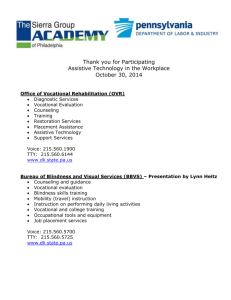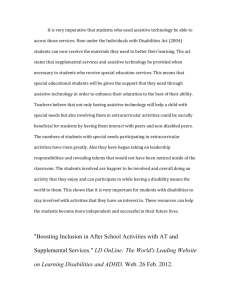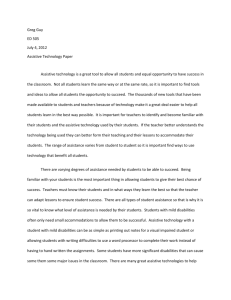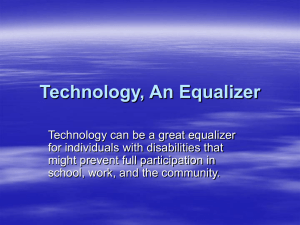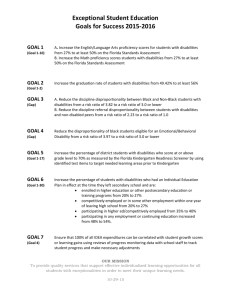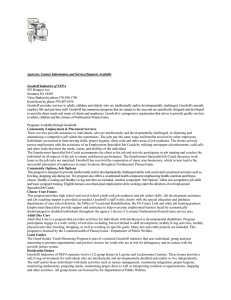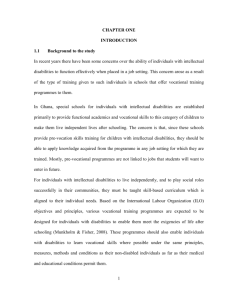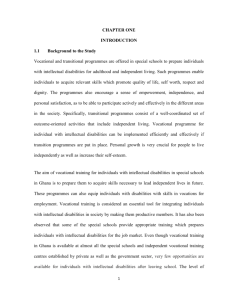Special Education Definitions
advertisement
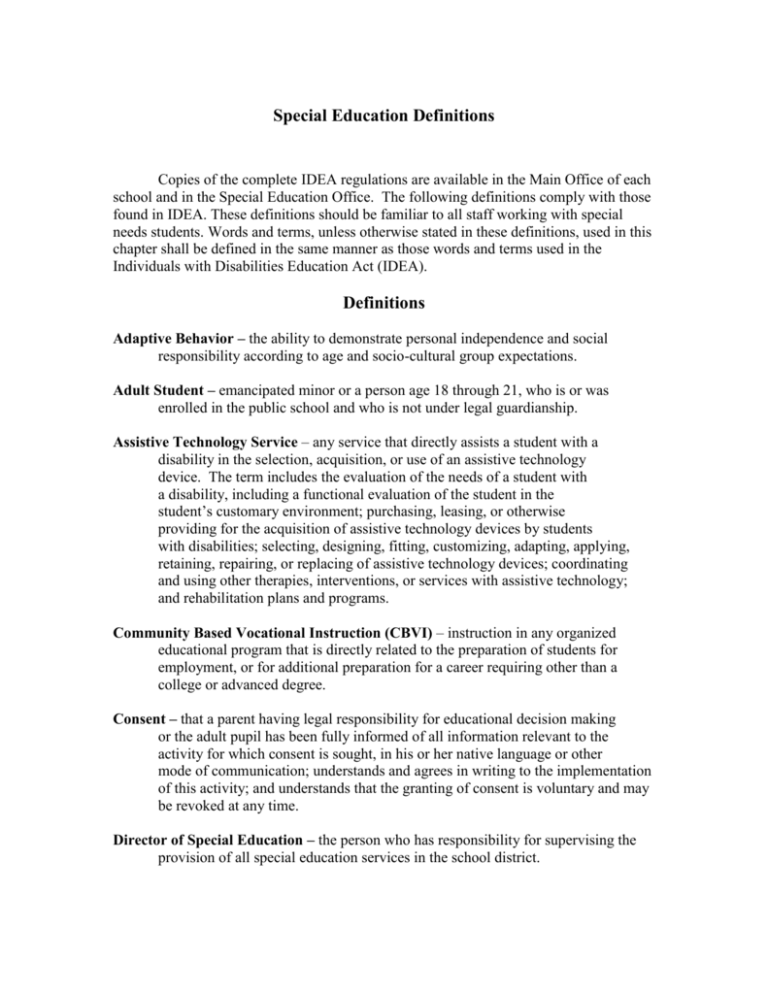
Special Education Definitions Copies of the complete IDEA regulations are available in the Main Office of each school and in the Special Education Office. The following definitions comply with those found in IDEA. These definitions should be familiar to all staff working with special needs students. Words and terms, unless otherwise stated in these definitions, used in this chapter shall be defined in the same manner as those words and terms used in the Individuals with Disabilities Education Act (IDEA). Definitions Adaptive Behavior – the ability to demonstrate personal independence and social responsibility according to age and socio-cultural group expectations. Adult Student – emancipated minor or a person age 18 through 21, who is or was enrolled in the public school and who is not under legal guardianship. Assistive Technology Service – any service that directly assists a student with a disability in the selection, acquisition, or use of an assistive technology device. The term includes the evaluation of the needs of a student with a disability, including a functional evaluation of the student in the student’s customary environment; purchasing, leasing, or otherwise providing for the acquisition of assistive technology devices by students with disabilities; selecting, designing, fitting, customizing, adapting, applying, retaining, repairing, or replacing of assistive technology devices; coordinating and using other therapies, interventions, or services with assistive technology; and rehabilitation plans and programs. Community Based Vocational Instruction (CBVI) – instruction in any organized educational program that is directly related to the preparation of students for employment, or for additional preparation for a career requiring other than a college or advanced degree. Consent – that a parent having legal responsibility for educational decision making or the adult pupil has been fully informed of all information relevant to the activity for which consent is sought, in his or her native language or other mode of communication; understands and agrees in writing to the implementation of this activity; and understands that the granting of consent is voluntary and may be revoked at any time. Director of Special Education – the person who has responsibility for supervising the provision of all special education services in the school district. Educational Advocate – a person assigned to act in special educational matters on behalf of a child who has been referred for evaluation or in need of special education, when parents are unknown or unavailable, or when the child in the custody of a state agency and the parents do not retain educational decisionmaking rights also known as a surrogate parent. Free Appropriate Public Education (FAPE) – special education and related services which: a)are provided at public expense, under public supervision and direction and with out charge; b) meet state education standards; c) include preschool, elementary school or secondary education; d) are provided in conformity with an individualized educational plan which meets the requirements of these regulations; and e) assure equal educational development with all students. Hearing – due process administrative hearing conducted through the State Department of Education IDEA – Individuals With Disabilities Education Act. IEP – Individualized Education Program Independent Evaluator – an individual or group of individuals who are not employed by the public school, who are registered, certified, licensed or otherwise approved to perform the assessments requested by the parent pursuant to these regulations. Individualized Education Program – a written plan developed at a meeting which sets forth goals and measurable objectives and describes an integrated, sequential program of individually designed educational activities and/or related services necessary to achieve the stated goals and objectives. This plan shall establish the rationale for the student’s educational placement, serve as the basis for program implementation and comply with the mandates set forth in this chapter. Lease Restrictive Environment (LRE) – the program and placement which ensures that, to the maximum extent possible, a child in need of special education, including children in public or private institutions or other care facilities, is educated with children who are not in need of special education, and that special classes, separate schooling or other removal of a child in need of special education from the regular education environment occurs only when the nature or severity of the special needs is such that education in regular classes with the use of supplementary aids and services cannot be achieved satisfactorily. Multidisciplinary Team – individuals from a variety of disciplines engaged in a collective effort to assess the needs of students. Native Language – the language or mode of communication normally used by a person with a limited ability to speak or understand the English language. Nonpublic School – an elementary or secondary school, other than a public school, with in the State, providing education in grades kindergarten through 12, or any combination of grades, in which a pupil age five through 20 may fulfill compulsory school attendance. Nonpublic School Student – any student who is enrolled full time in a nonpublic school. A student who boards at a nonpublic school shall be considered a resident of the school district in which the parent(s) resides. Parent(s) – the natural parent(s), the legal guardian(s), foster parent(s), surrogate parent(s), person acting in the place of a parent such as the person with whom the student legally resides and/or a person legally responsible for the student’s welfare. Unless parental rights have been terminated by a court of appropriate jurisdiction, the parent(s) retains all rights under this chapter. Recreation – for students with educational disabilities, instruction to enable the student to participate in appropriate leisure time activities, including involvement in recreation programs offered by the district board of education and the facilitation of a pupil’s involvement in appropriate community recreation programs. Regular Education Program – the school program and pupil assignment for children without need of special education. This program normally leads to college preparatory or technical education or to a career, has a typical grade progression from kindergarten to high school, and offers a full range of supportive services which are normally provided to children without need of special education. Related Services – for students with educational disabilities, counseling and/or training for parents relative to the education of a student, recreation, occupational therapy, physical therapy, rehabilitation counseling, school nursing services, social work services, transportation, as well as any other appropriate developmental, corrective and supportive services required for a student to benefit from education as required by the student’s individualized Education program. Special Education – specially designed instruction to meet the educational needs of students with educational disabilities including, but not limited to, subject matter instruction, physical education and vocational training. Student – a person age three (3) through twenty (20) who is entitled to receive educational programs and services in accordance with Federal or State law or regulation. Student Age – the school age of a student as defined by the following: 1. Age three – attainment of the third birthday. Children attaining 2. 3. the age three who are eligible for Preschool Special Education Services, shall have a free, appropriate public education available to them provided by the district board of education. Age five – the attainment of age five by September 1st. Students with educational disabilities attaining age five during the school year shall continue to be provided preschool services for the balance of the school year. Age 21 – the attainment of the twenty-first birthday by June 30 of that school year. Students with educational disabilities attaining age 21 during the school year shall continue to be provided services for the balance of that school year Student with Educational Disability – a student who has been determined to be eligible for special education and/or related services. Transition Services – a coordinated set of activities for a pupil with educational disabilities, designed within an outcome oriented process, that promotes movement from school to post-school activities, including post secondary education, vocational training, integrated employment (including supported employment), continuing and adult education, adult services, independent living, or community participation. Vocational Education – the approved type of education, purposefully designed to educate and prepare students of all ages for employment and continuing academic and occupational preparation through a balance of classroom instruction, supportive services and occupational experience to develop life-long skills so that upon completion of vocational technical programs, students are qualified to pursue, directly or indirectly, opportunities emanating from such vocational technical programs.
